Skip to content
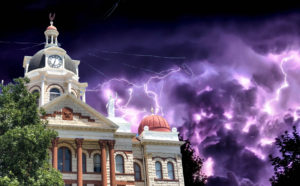
I was considering what my first October post should be this year . . . a ghost story, a fascinating “story behind the stones” of old cemeteries, a thrilling story from Texas history, or a historic site. Why not all of the above? If you travel to Coryell County, it’s all in one place.
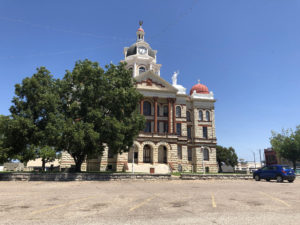
Workers at the Coryell County Courthouse in Gatesville have felt an ‘other-worldly’ presence for years: cold breezes through the county clerk’s office, an occasional firm tap on the shoulder and even furniture being re-arranged in the middle of the night. Locals have dubbed the courtly ghost ‘Elroy’ because they aren’t certain who it actually is. But there are theories that the spirit can’t leave the courthouse because of a connection to a sensational 1909 murder right in the courtroom.
It happened over 100 years ago.
In 1908 a 19-year-old young woman named Verna Mabel Ware was assaulted by a 20-year-old-man named John J. Hanes in the Gatesville area. It was alleged that Hanes – reportedly studying pharmacy – drugged chocolates he gave to the girl at a spring picnic and then took advantage of her, resulting in the birth of a child.
He was charged with seduction, as the word ‘rape’ wasn’t used at the time because it was thought to be too harsh.
Hanes reportedly had several male friends lie on the witness stand during his trail.
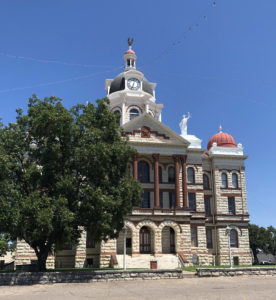 It’s apparent that the behavior wasn’t unusual at the time, because before his own trial proceedings were finished he sat in the courtroom on February 2, 1909 watching another man named Wiley Mulhouse who was being prosecuted on the same charge. Because the jail was in the basement then, Hanes would have been returning to his cell at the end of the day. The two trials had split the town into separate contentious sides.
It’s apparent that the behavior wasn’t unusual at the time, because before his own trial proceedings were finished he sat in the courtroom on February 2, 1909 watching another man named Wiley Mulhouse who was being prosecuted on the same charge. Because the jail was in the basement then, Hanes would have been returning to his cell at the end of the day. The two trials had split the town into separate contentious sides.
Both Ware and Hanes came from respected farming families in the area and had many friends.
Verna, distraught with her situation, stood in the rotunda with her brother Ezra looking through the plate glass window that separated them from the courtroom. Fearing she would never see justice, she decided to take action herself.
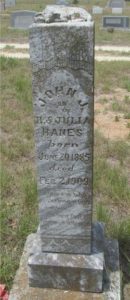 She pulled a 38 caliber revolver from her purse and shot through the glass, hitting Hanes three times in the back. He died instantly. As people in the courtroom scattered, Ware continued to fire hitting James J. Smith (age 68) in the head, Dave Ross (age 48) in the arm and back and A. P. Wiley, Jr. in the leg. Only Wiley would survive his wounds.
She pulled a 38 caliber revolver from her purse and shot through the glass, hitting Hanes three times in the back. He died instantly. As people in the courtroom scattered, Ware continued to fire hitting James J. Smith (age 68) in the head, Dave Ross (age 48) in the arm and back and A. P. Wiley, Jr. in the leg. Only Wiley would survive his wounds.
Initial newspaper accounts reported that the three other wounded men were merely spectators in the courtroom, but local lore hints that they may have been character witnesses for Hanes.
Judge Arnold maintained composure during the incident and directed officials to take Ware downstairs to the jail. Physicians who visited her in her cell declared that she was in a “critical condition of nervous collapse.”
After a few days in jail formal charges were made of three counts of murder and one for carrying a pistol. Her bond was set at $7,500, and was paid by citizens of the community who sympathized with Ware and her situation.
The trail began late in 1909 and continued until February when she was declared not guilty due to temporary insanity. Reporters wrote that at times during the proceedings the jury and spectators were moved to tears. She did have to pay a fine for having the gun, however.
 So who is the courthouse ghost? Perhaps it is Hanes who was positive he would get away with his transgression, and now is trapped in the courthouse. Perhaps it’s the spirit of someone else. We may not ever know for sure.
So who is the courthouse ghost? Perhaps it is Hanes who was positive he would get away with his transgression, and now is trapped in the courthouse. Perhaps it’s the spirit of someone else. We may not ever know for sure.
But if you visit the Coryell courthouse, be prepared to feel an unseasonable chill in the air.
Now, I’m curious…are you more likely to visit the courthouse because of it’s beauty, or because of its ghost?
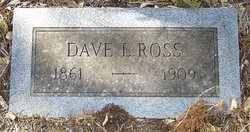
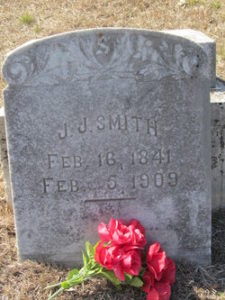
Incidentally….
-
The jury for the Mulhouse case returned a few days later and returned a guilty verdict with a sentence of two years.
-
The three shooting victims are buried in area cemeteries, with nothing on their markers to denote their newsworthy demises.
-
In the 1990s a local artist even depicted the courthouse in an oil painting with a shadowy figure peering out of a second floor window over Main Street.
-
The year after her trial, Verna Ware married W.R. Eck who adopted her daughter Opal. He unfortunately passed away in 1918.
-
Ware remarried, but it didn’t last. She and Opal moved to Utah were Verna passed away in a rest home in 1973.
-
And the courthouse? It’s well worth visiting with or without the ghost in attendance. The Beaux Arts beauty was built in 1897-1898 of red and white sandstone from a design of architect Wesley Clark Dodson.
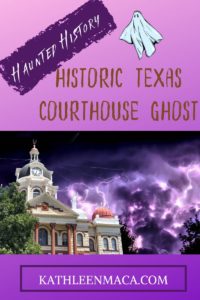
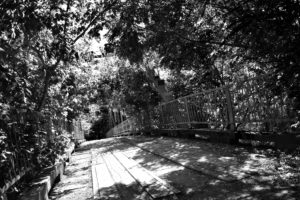
What? You want another Texas ghost story to usher in Halloween? Well, who am I to say no to such a reasonable request . . .
Hear the word “Denton,” and you might thing of University of North Texas or Texas Women’s University.
But being the lover of ghostly tales that I am, my “to see” list recently included the Old Alton Bridge . . . known to locals and students as Goatman’s Bridge. According to legend if you go down to the bridge at night, turn off you headlights and honk twice – you’d see the glowing red eyes of the Goatman himself on the other side.
Now let’s clear something up to start with you can’t actually drive across the bridge (any more). It has been blocked off as a pedestrians only bridge. There is even a wonderful art installation that lights the beams with multicolored lights at night. Fun to stop and see even if you aren’t looking for something otherworldly.

Back when the bridge was built in 1884 over Hickory Creek, it was a busy thoroughfare. Now it’s one of those beautiful relics with a web of cast iron arching over creaking wood plank decking. A spot that has become oh-so-popular with thrill seekers and ghost hunters.
 Since the 1930s several different versions of the Goatman tale have circulated among locals. After all, most local legends are passed down verbally and change just a bit with each telling.
Since the 1930s several different versions of the Goatman tale have circulated among locals. After all, most local legends are passed down verbally and change just a bit with each telling.
The most popular version of the story relates the tale of an African-American named Oscar Washburn and his family who kept a herd of goats near the bridge. They made a good living from the animals’ meat, milk, cheeses and hides. But when the man hung a sign on the bridge directing his customers with the words “This way to the Goatman,” the local Ku Klux Klansmen were offended by his pride.
 Late on a dark night in 1938, a lynch mob stormed the family’s shack and dragged the screaming Goatman to the bridge, where they put a noose around his neck and flung him over the side. And there’s a twist to the story: when the marauders went down the banks of the creek to admire their handywork…the noose was empty and Washburn was nowhere to be seen.
Late on a dark night in 1938, a lynch mob stormed the family’s shack and dragged the screaming Goatman to the bridge, where they put a noose around his neck and flung him over the side. And there’s a twist to the story: when the marauders went down the banks of the creek to admire their handywork…the noose was empty and Washburn was nowhere to be seen.

 Thinking he had escaped, they went back to the shack and set in on fire – with the unfortunate family inside – to lure Washburn out of the woods. But he was never seen again . . . at least in the flesh.
Thinking he had escaped, they went back to the shack and set in on fire – with the unfortunate family inside – to lure Washburn out of the woods. But he was never seen again . . . at least in the flesh.
Stories advise seekers of the vengeful spirit to knock three times on the bridge, or honk their car horn to summon the spirit. They even say that the Goatman will take his revenge on anyone who dares to summon him that is of the same bloodline as one of the murderers. (So it might be wise to do a bit of genealogy before you go!)
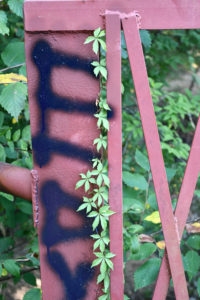 Goatman legends exist in several other towns in Texas and several other states, with slight variations. They probably serve more as a warning of morality than a reminder of an actual historical event. No African American named Oscar Washburn lived in the area at the time, and there were no reports of lynchings in 1938. But visitors persist in reporting strange smells and sights, being touched or grabbed and hearing snarling coming from the woods.
Goatman legends exist in several other towns in Texas and several other states, with slight variations. They probably serve more as a warning of morality than a reminder of an actual historical event. No African American named Oscar Washburn lived in the area at the time, and there were no reports of lynchings in 1938. But visitors persist in reporting strange smells and sights, being touched or grabbed and hearing snarling coming from the woods.
If you want to stop at Denton’s Goatman Bridge and tempt fate for yourself . . . be my guest!
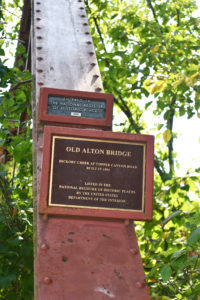

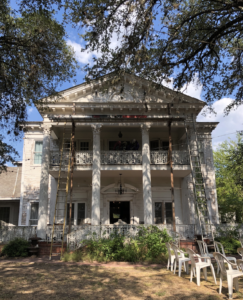
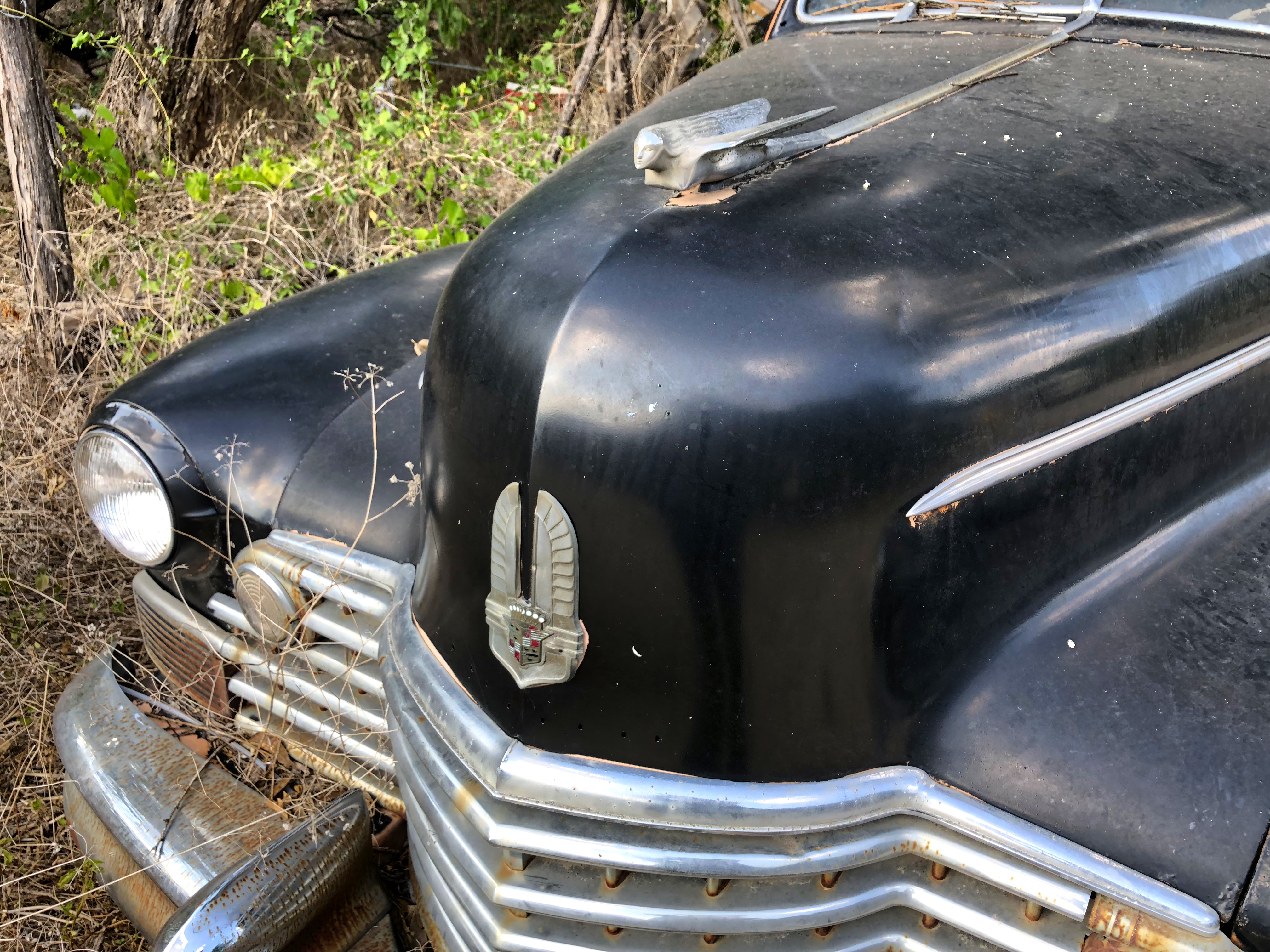
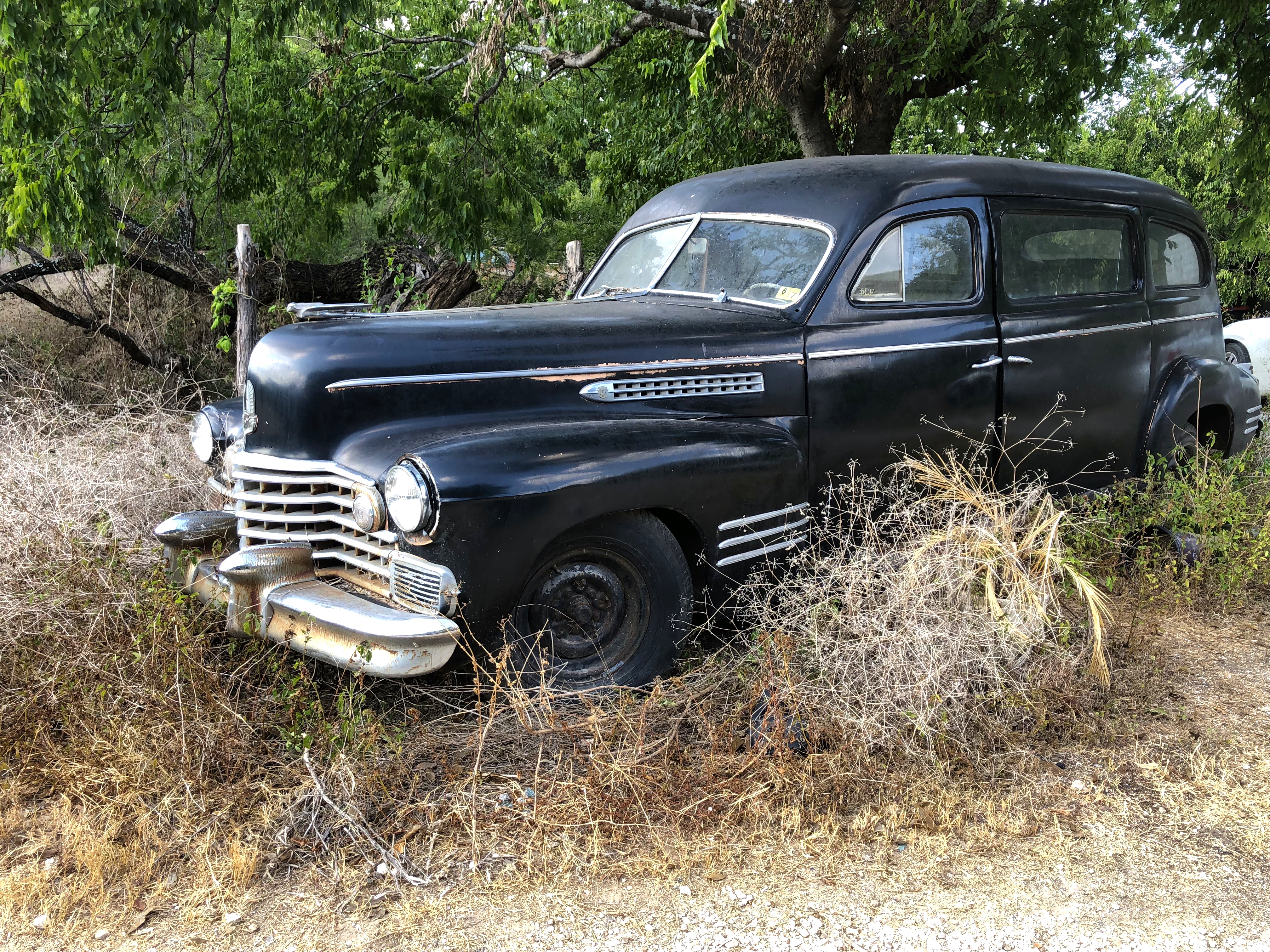 Have you ever heard of San Antonio’s Black Swan Inn? Sounds elegant, doesn’t it? The 150-year-old Greek Revival named after Shakespeare’s favorite bar looks like an iconic Southern mansion. It’s now a popular venue for weddings, parties and even memorials but the dark past of the home and the land that it sits on has given it a reputation as one of the most haunted places in the state.
Have you ever heard of San Antonio’s Black Swan Inn? Sounds elegant, doesn’t it? The 150-year-old Greek Revival named after Shakespeare’s favorite bar looks like an iconic Southern mansion. It’s now a popular venue for weddings, parties and even memorials but the dark past of the home and the land that it sits on has given it a reputation as one of the most haunted places in the state.
You’ll probably need help from an app or map to find the home, which is situated along Salado Creek and nestled under a canopy of ancient trees.
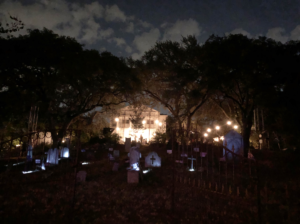
The bloody 1842 Battle of Salado occurred on the property between General Adrian Woll, Sam Houston and their troops and the less successful Mexican troops who were fighting for control of the area. A total of 60 men lost their lives on the hill, just 20 years before the mansion was built on the same soil.
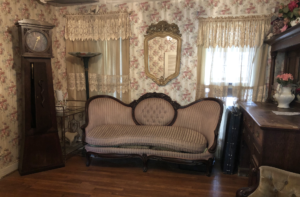 The current owner moved her family into the mansion in 1990 and operated her Victorian garment company from the extra space. Soon the family heard repeated door slammings, saw a “shadow man” who sometimes pinched the children hard enough to cause bruises and had to admit they weren’t the only “residents” at the Inn.
The current owner moved her family into the mansion in 1990 and operated her Victorian garment company from the extra space. Soon the family heard repeated door slammings, saw a “shadow man” who sometimes pinched the children hard enough to cause bruises and had to admit they weren’t the only “residents” at the Inn.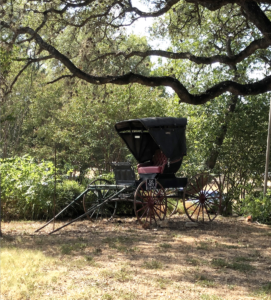
Eight or more spirits are said to roam the house and land, including a Confederate soldier, former owners (one of whom hung himself . . . or was murdered, depending on who you ask), and a blonde-haired little girl.
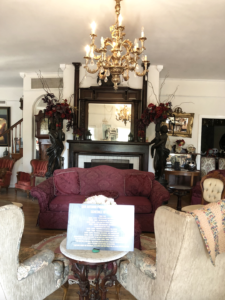 When I was invited to speak at a paranormal conference at the home a couple of years ago I enjoyed touring the interior, which is appropriately decorated and adorned with a heavy-hand. Victorian did love their “stylish clutter,” after all. The home needs quite a lot of work, but it’s easy to appreciate her beauty even through the chipping paint.
When I was invited to speak at a paranormal conference at the home a couple of years ago I enjoyed touring the interior, which is appropriately decorated and adorned with a heavy-hand. Victorian did love their “stylish clutter,” after all. The home needs quite a lot of work, but it’s easy to appreciate her beauty even through the chipping paint.
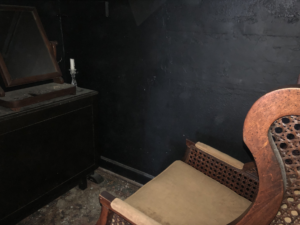 One of the most popular spots inside the house for the local “ghost hunters” was a small closet off the main parlor. The interior was painted black and a chair and antique mirror were set inside. The locals told me that if you sit in the chair – in the dark – and stare into the mirror, the spirits can communicate directly with you.
One of the most popular spots inside the house for the local “ghost hunters” was a small closet off the main parlor. The interior was painted black and a chair and antique mirror were set inside. The locals told me that if you sit in the chair – in the dark – and stare into the mirror, the spirits can communicate directly with you.
No, I didn’t “experience” anything while I was at the Black Swan, but perhaps I was just too distracted thinking about the talk I was about to give to the crowd.
If you’d like to see if you can detect anything otherworldly for yourself, the Black Swan Inn regularly hosts the “Haunted Cocktail Hour” and other events that are open to the public.
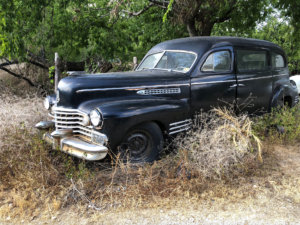
Are you brave enough to visit after dark?
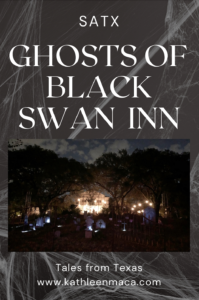
A state as big as Texas is bound to have a lot of ghost stories. . . luckily for us!
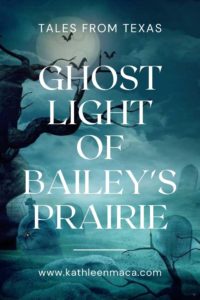
The first tale I’ll share this October is probably one of the most famous to native Texans, and takes place in Bailey’s Prairie.
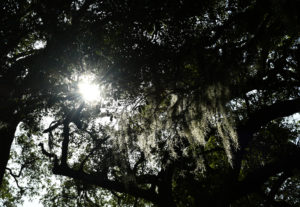
If you happen to be motoring south on Highway 35 and see a bouncing orange glow . . . it’s probably Old Brit Bailey in search of his jug of whiskey!
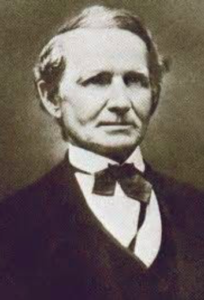 James Briton “Brit” Bailey was more than a real person. He was a real character. Known for his eccentric personality, love of drink and penchant for brawls, life was never dull in his presence. At six feet tall (quite a height for the time), was an imposing figure with his jet-black hair and broad brimmed hat.
James Briton “Brit” Bailey was more than a real person. He was a real character. Known for his eccentric personality, love of drink and penchant for brawls, life was never dull in his presence. At six feet tall (quite a height for the time), was an imposing figure with his jet-black hair and broad brimmed hat.
“Brit” was born in North Carolina on August 1, 1779 in North Carolina. After fighting in the War of 1812 the pioneer came to Texas in 1818 with his second wife, Dot, six children and his slaves, settling in what came to be known as Brazoria County. Several years later Stephen F. Austin would arrive with the “Old Three Hundred” to settle parcels of land in the area.
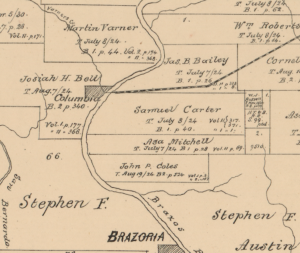
Not one to pass up a fight or give ground on a cause he believed in, Brit was also a veteran of the Battle of Jones Creek in 1824, and the Battle of Velasco in 1832.
Locals love to share a story about the rowdy rancher that captures his personality. It seems that he shot at a traveling preacher’s feet to watch him dance. After the episode when the men were sharing a drink, the preacher took the opportunity to grab Brit’s gun and m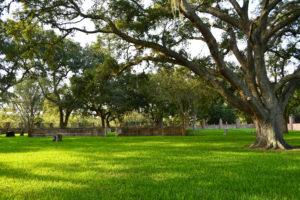 ade the same demand. Roaring with delight, Brit jumped onto a table and energetically danced a jig while onlookers applauded.
ade the same demand. Roaring with delight, Brit jumped onto a table and energetically danced a jig while onlookers applauded.
His temper was as legendary as his humor, and one night he apparently set fire to all the buildings on his own property except the main house.
On December 6, 1832 Brit passed away quietly in his own bed from fever that many think may have been cholera.
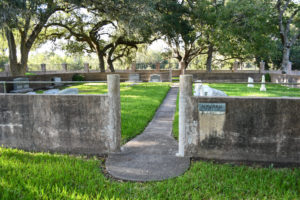
Peculiar instructions in his will provided one more surprise for the community. He had requested to be buried standing up (now that took a deep hole!), facing west with his rifle over his shoulder, powder horn by his side, and a jug of whiskey.
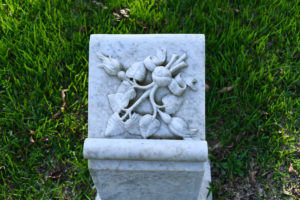 Brit didn’t want anyone passing by his grave saying, “There lies Brit Bailey” and he figured if her was standing up….they couldn’t!
Brit didn’t want anyone passing by his grave saying, “There lies Brit Bailey” and he figured if her was standing up….they couldn’t!
He was buried in a grove near his home and though all his instructions were followed, his jug whiskey was omitted from the coffin. His widow objected to that item, saying he had imbibed enough in his lifetime.
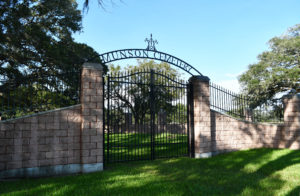
According to legend his ghost in the form of a strange light roams his old homestead at Bailey’s Prairie looking for the lost jug of whiskey. Many describe it as having an orange glow and bobbing around about four to six feet above the ground – the eight a lantern might be held on horseback.
Back when the story originated, it was said that Old Brit searched the prairie every seven years, but either people weren’t paying attention or he’s getting thirstier because now Bailey’s Light is seen on a regular basis.
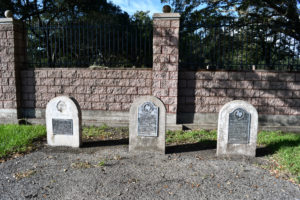
Naysayers theorize the glow is caused by puffs of natural gas escaping from the ground, but you’ll be hard pressed to convince witnesses of that.
Bailey’s Prairie, Brit Bailey Boulevard (FM 521) and even a local chapter of the DAR are named for this unique figure in Texas history.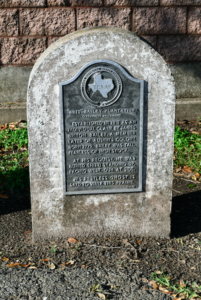
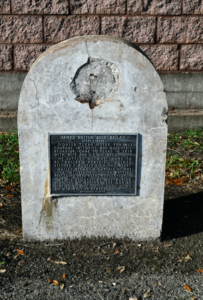
Texas State Historical Markers telling Brit’s story can be found just outside the gates of Munson Cemetery. Unfortunately, someone has vandalized the emblem off of Brit’s marker. (Hope that Brit chased them!)
Are you brave enough to search out Bailey’s Light on a dark night on the prairie?
Subject a real person: Confirmed
Location: Bailey’s Prairie, Brazoria County. Stretch of Highway 35 between Angleton and West Columbia
Best time to see phenomenon: Twilight

For more Texas ghost stories check out
available on amazon.com.
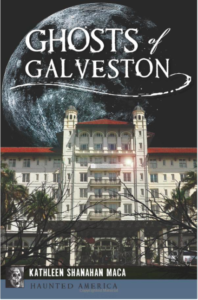
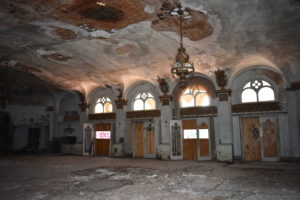
It’s impossible to roam the halls of Mineral Wells’ 14-story Baker Hotel without uttering the stories of its hauntings. And while I look forward to sharing more about the history and state of the hotel itself in my next post, Halloween calls and insists that we revisit their stories once more.
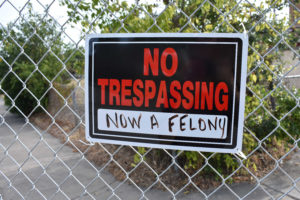 Now closed to the public the once luxurious Baker was one of the most popular resort destinations of its day.
Now closed to the public the once luxurious Baker was one of the most popular resort destinations of its day.
Now the graffiti covered walls with their flaking paint and the crumbling walls and ceilings create what seems to be the ideal home for the numerous phantoms that are said to roam the premises.
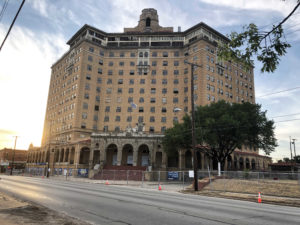
Climb the front stairs, turn on your flashlight and join me for a visit with the Baker Hotel ghosts.
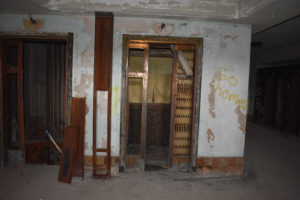
ELEVATOR ANTICS
15-year-old Douglas Moore earned a job as a passenger elevator operator at the grand hotel two years after his family moved to Mineral Wells.
On January 16, 1948 Douglas arrived early for work and went to the basement to catch up with his friends working maintenance shifts. Teenage talk turned to horseplay and Douglas began to play with the service elevator at the base of the stairs, jumping in and out when it was in motion.
Mind you, this was in the days before safety features would keep doors from closing entirely if something (or one) was in the way.
You see where this is going…and it can’t be good.
One of his friends notice that Douglas hadn’t jumped quite far enough to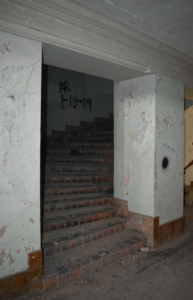 get his body totally inside the elevator compartment on one attempt, and pulled the young man’s legs to try to get him out. Tragically, he wasn’t quite fast enough and Douglas was caught between the doors and floor of the rising elevator, crushing him at the abdomen.
get his body totally inside the elevator compartment on one attempt, and pulled the young man’s legs to try to get him out. Tragically, he wasn’t quite fast enough and Douglas was caught between the doors and floor of the rising elevator, crushing him at the abdomen.
Even more gruesome, it was half an hour before help could dislodge him and get him to the hospital, where he died of his injuries.
As if his fate wasn’t horrific enough, lore states that he had actually been cut in half and that apparition of merely the top half of the unfortunate teen has been seen throughout the basement. According to his death certificate was an exaggeration of his fatal injuries, however.
Visitors have said that those who call the young man’s name aloud will feel a cold rush of air push by them…but it’s best not to tempt him while standing too close to the elevator shaft. The teen might just be lonely for a bit of company after all these years.
In an odd coincidence, his only brother Thomas was also killed as a teenager in a horrific accident while at his job in Mineral Wells.
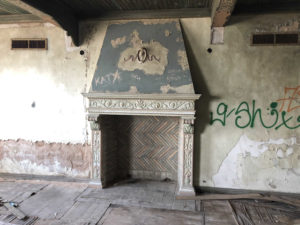
BAKER, BUT WHICH ONE?
Earl Maynard Baker, nephew of the hotel’s found Theodore B. Baker, managed the Baker Hotel for over 40 years and lived in its Presidential Suite. After a string of contentious years with his family, spouse and even the community, Baker had a heart attack in his suite and subsequently died in the local hospital.
Reports say that he (or perhaps his uncle, the original resident) endlessly paces the rooms, now only a shadow of their former elegance. When the hotel was available to guides of ghost tours it was customary to knock before entering the suite as a form or respect…or perhaps to avoid his fiery temper.
Visitors to the area have claimed to smell cigar smoke, and to have small items from their purses or pockets come up missing…only to be found on the premises by tour guides later.
Whichever Baker may remain, he certainly has a sense of humor!
THE MISTRESS
The most famous spectral resident of the Baker is the lovely apparition of a ghost with red hair and green eyes. A porter of the hotel first saw her in the 1960s.
Known as the “Lady in White” she is believed to be the former manager’s mistress Virginia Brown, she flirts with men whom she finds attractive and resents the intrusion of other women in her suite at the southeast corner of the 7th floor.
Apparently t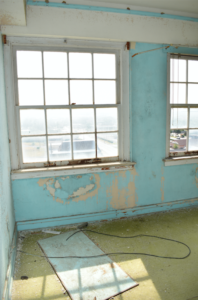 he woman, distraught from the affair, committed suicide by jumping to her death from the window of her room (or the roof, depending on which version of the tale is told).
he woman, distraught from the affair, committed suicide by jumping to her death from the window of her room (or the roof, depending on which version of the tale is told).
Her distinctive lavender perfume wafts throughout the floor; a red lipstick was even found by a maid on the rim of a glass when no one was staying in the suite.
The most restless spirit in the hotel, she refuses to be confined to one floor as she was in life, and the clicking of her high heels can be heard on the lobby floor.
I couldn’t find a Virginia Brown that would fit her age range and profile living in Mineral Wells at the time, though there were three others with the same name.
Whatever the name of the permanent guest, she is not to be taken lightly.
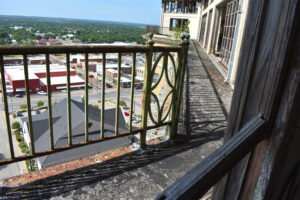
HIGH DIVE DURING COCKTAILS
The parties held in the Cloud Ballroom on the 12th floor were legendary, and guests often enjoyed themselves to excess.
One intoxicated woman actually tried to jump from the ballroom balcony into the pool below and naturally died in the attempt. Versions of the story say that she may have been racing her boyfriend who fled down the stairs to the pool deck and others that perhaps she may have received an unfriendly push.
Now she paces along the balcony considering her fate.
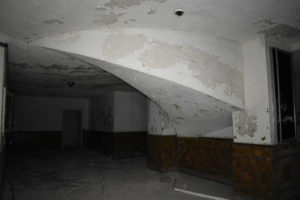
The Cook and the Maid
One of the persistent tales linked with the Baker is that of a hotel cook who was having an affair with one of the chambermaids. The legend states that the hotel’s cook was having an affair with one of the maids. The story goes that the woman threatened to expose their relationship to the cook’s wife, causing him to fly into a fit of rage and stab her to death in the kitchen pantry.
It’s said that female visitors have reported hearing a woman’s voice telling them to leave when they entered the kitchen.
Not surprisingly there doesn’t seem to be any evidence to support that such a murder too place – though the hotel’s food was reputed to be “to die for.”
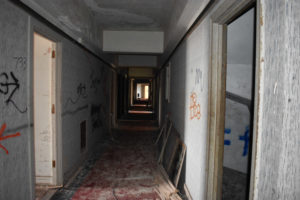
LITTLE BOY
Considering the fact that many visitors to Mineral Wells came in search of thee curative properties the local spring waters were said to possess, it shouldn’t come as any surprise that not all cures were successful.
The spirit of a little boy about six-years-old plays in the hallways of the hotel, accompanied by his large, shaggy dog companion. A visiting medium claims that the boy communicated to her that he passed away in 1933, when his parents brought him there seeking treatment for his leukemia. He tends to be watched over by the spirit of an older woman who remains nearby, and try to gain visitors attention by bouncing his rubber ball.
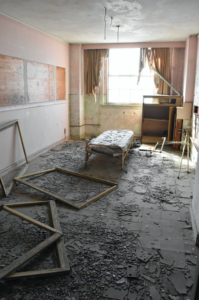
OTHER DEATHS
Any hotel that has had some many people pass through its doors has seen its share of tragedies, and the Baker is no exception.
In 1944, a federal civil investigator – probably assigned to Camp Wolters- threw himself out of a window from Room 919. The FBI is said to have investigated, but no foul play was found.
In 1952, a man rented a room, went upstairs and cut his throat.
In the 1940s one man murdered another man in the lobby, reputedly over a private parking space. The murderer was found guilty, but released…enough of a reason for any victim to roam in anger.
Stories have also circulated about a spooky, secret network of tunnels beneath the hotel. There is one known passageway that leads from the hotel the pool on the property, and it’s possible that originally extended northeast to the original water tower (now a parking lot for a Methodist church). No other tunnels have been discovered but just the possibility can cause a shiver.
Although it doesn’t have stories of specific haunting attached to it, the hotel spa on the second floor is unarguably one of the creepiest areas on the property. It’s difficult to say whether that feeling is due to the archaic equipment crumbling in place or the general atmosphere.
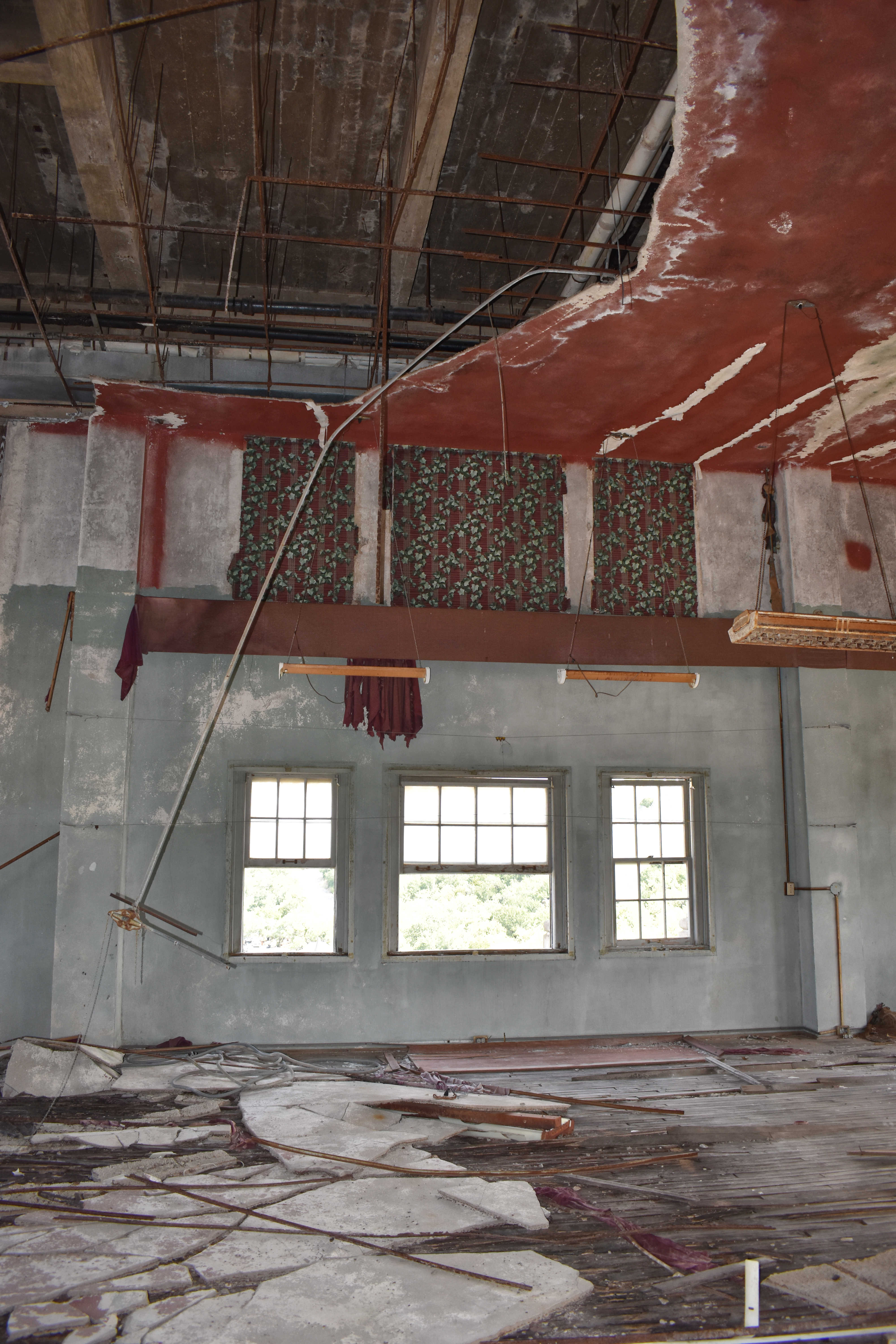
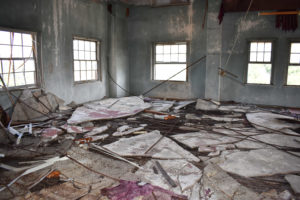
The “Brazos Room”
When a group of World War II veterans and their spouses toured the hotel, multiple people in the group heard voices chatting, orchestra music playing and the sound of dinnerware and utensils being used. This occurrence seemingly had not happened before or since that day. Maybe their recognized their contemporaries?
With the Baker Hotel now receiving long overdue renovations and restoration, the ghosts of the famous inn will hopefully have plenty of living company very soon.
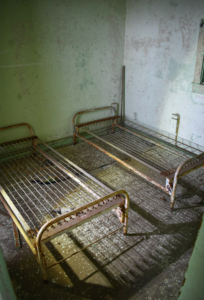
Which floor would you choose to stay on?
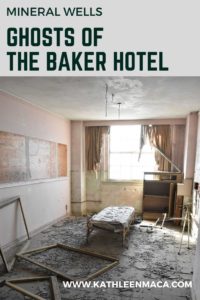
 It’s apparent that the behavior wasn’t unusual at the time, because before his own trial proceedings were finished he sat in the courtroom on February 2, 1909 watching another man named Wiley Mulhouse who was being prosecuted on the same charge. Because the jail was in the basement then, Hanes would have been returning to his cell at the end of the day. The two trials had split the town into separate contentious sides.
It’s apparent that the behavior wasn’t unusual at the time, because before his own trial proceedings were finished he sat in the courtroom on February 2, 1909 watching another man named Wiley Mulhouse who was being prosecuted on the same charge. Because the jail was in the basement then, Hanes would have been returning to his cell at the end of the day. The two trials had split the town into separate contentious sides. She pulled a 38 caliber revolver from her purse and shot through the glass, hitting Hanes three times in the back. He died instantly. As people in the courtroom scattered, Ware continued to fire hitting James J. Smith (age 68) in the head, Dave Ross (age 48) in the arm and back and A. P. Wiley, Jr. in the leg. Only Wiley would survive his wounds.
She pulled a 38 caliber revolver from her purse and shot through the glass, hitting Hanes three times in the back. He died instantly. As people in the courtroom scattered, Ware continued to fire hitting James J. Smith (age 68) in the head, Dave Ross (age 48) in the arm and back and A. P. Wiley, Jr. in the leg. Only Wiley would survive his wounds. So who is the courthouse ghost? Perhaps it is Hanes who was positive he would get away with his transgression, and now is trapped in the courthouse. Perhaps it’s the spirit of someone else. We may not ever know for sure.
So who is the courthouse ghost? Perhaps it is Hanes who was positive he would get away with his transgression, and now is trapped in the courthouse. Perhaps it’s the spirit of someone else. We may not ever know for sure.















































